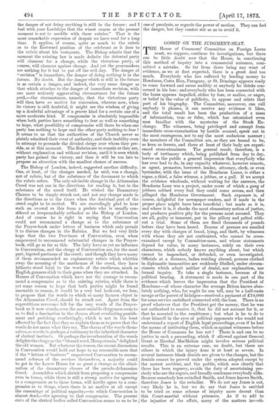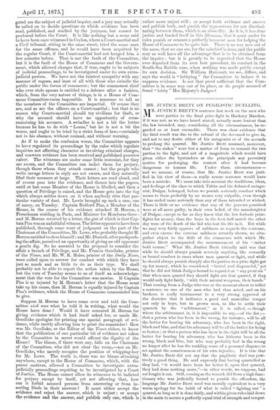GOSSIP ON THE .1 UDGMENT-SEAT.
THE House of Commons' Committee on Foreign Loans must, we suppose, continue its investigations, but there can be little doubt now that the House' in sanctioning
this method of inquiry into a commercial nuisance, com- mitted a mistake. So far from there being any want of evidence, as we at first expected, there is a great deal too much. Everybody who has suffered by lending money to Honduras Costa Rica, Paraguay, or St. Domingo appears ready to come forward and swear audibly at anybody he thin con- cerned in his loss; and everybody who has been connected with the loans appears impelled, either by fear, or malice, or anger, or belief in the value of publicity, to appear and relate that part of his biography. The Committee, moreover, can call anybody it pleases, it can receive any evidence it likes, and the total result has been the production of a raass of information, true or false, which has astonished even men familiar With the mysteries of the Stock Ex- change. The witnesses, being privileged and exempt froth immediate cross-examination by hostile counsel, speak out in the most courageous, not to say the most audacious manner; the members of the Committee are, as they are bound to be, as keen as ferrets, and three at least of their body are experi- enced cross-examiners. The general result, therefore, is a body of testimony which, being published from day to day, leaves on the public a general impression that everybody who has ever had to do, in any capacity whatever, however remote, as agent, promoter, borrower, lender, attorney, clerk, or even bystander, with the issue of the Honduras Loans, is either a rogue, a thief, a false witness, a jobber, or a gull. If we aecept the evidence wholesale, without waiting for the answerS, the Honduras Loan was a project, under cover of which a gang of jobbers robbed every fool they could come across, and then pillaged the Honduras Government. Such exposure is, of course, delightful for newspaper readers, and if made in the proper place might have been beneficial ; but made as it is, and where it is, it shocks the most elementary notion of justice, and produces positive pity for the persons most accused. They are all, guilty or innocent, put in the pillory and pelted with- out a trial. Some of them are fined thousands of pounds before they have been heard. Dozens of persons are assailed every day with charges of fraud, lying, and theft, by witnesses with whom they are not confronted, who cannot be cross- examined except by Committee-men, and whose statements depend for value, in many instances, solely on their own characters, which nobody knows anything about, but which cannot be impeached, or defended, or even investigated. Officials at a distance, ladies residing abroad, persons clothed in diplomatic immunities are recklessly libelled, under circum- stances which admit neither of denial, nor explanation, nor formal inquiry. To take a single instance, because of its political bearing. A statement is made in one part of the evidence which leaves the impression that the President of Honduras—of whose character the average Briton knows abso- lutely nothing, who, for aught he can tell, may be a half-caste savage or the purest of hidalgos—received a payment of £10,000 for some service undefined connected with the loan. There is no proof whatever that the President got the money, that he was not authorised to receive it, that he did not account for it, or that he assented to the remittance ; but what is he to do to clear himself in the eyes of political opponents who would not understand a report of English legal proceedings, even if he had the means of instituting them, which as against witnesses before the House of Commons he has not ? There is and can be no justice in such a proceeding, which if allowed against General_ Grant or Marshal MacMahon might involve serious political results. This is an extreme case, no doubt, but there are others in which the injury done is at least as severe. In several instances blank denials are given to the charges, but the denials cannot be proved under the system adopted except by the merest accident, and the public, which sees clearly that there has been roguery, avoids the duty of ascertaining pre- cisely who are the rogues, and broadly condemns everybody alike. Because somebody has swindled Smith, and Jones knows Smith, therefore Jones is the swindler. We do not say Jones is not, very likely he is, but we do say that Jones is entitled to be tried on some scheme of inquiry more decent than this Court-martial without prisoners. As if to add to the injustice of the affair, many of the matters investi-
gated are the subject of judicial inquiry, and a jury may actually be called on to decide questions on which evidence has been read, published, and studied by the jurymen, but cannot be produced before the Court. It is like nothing but a scene said to have been once witnessed in Ceylon, where a Court-martial and a Civil tribunal, sitting in the same street, tried the same man for the same offence, and he would have been acquitted by the regular Court, if the Court-martial had not hanged him a few minutes before. That is not the fault of the Committee, but it is the fault of the House of Commons and the Govern- ment, which allowed charges that, if true' ought to be subjects of judicial proceedings, to be investigated under its own extra- judicial powers. We have not the faintest sympathy with any manner of rogues, and least of all with those who swindle the public under the forms of commerce ; but the commonest thief who ever stole spoons is entitled to a defence after a fashion, which, from the very nature of things, is in a House of Com- mons Committee-room impossible. It is nonsense to tell us the members of the Committee are impartial. Of course they are, and so are the officers on a Court-martial ; but that is no reason why Courts-martial should try civilians for theft, or why the accused should have no opportunity of cross- examining his accusers. A swindler is not a bit the better because he has to do with "Loans," but he is not a bit the worse, and ought to be tried by a strict form of law,—certainly not in his absence, without counsel, and without warning.
As if to make the confusion worse, the Committee appears to have regulated its proceedings by the rules which regulate inquiries not affecting character or involving criminal charges, and unworn evidence has been received and published quantum valeat. The witnesses are under some little restraint, for they are sworn, and the Committee can indict them for perjury, though those whom they attack cannot ; but the people who write savage letters in reply are not sworn, and they naturally libel their accusers at large. Their letters are read aloud, and of course pass into the evidence and thence into the papers, until at last some Member of the House is libelled, and then a question of Privilege is raised, and the House gets into the fog which always settles down on it when anybody stirs that par- ticular variety of dust. Mr. Lewis brought up such a case, one of many, on Tuesday. Captain Bedford Pim, a Member of the House, in the course of his evidence attacked M. Herran, a Frenchman residing in Paris, and Minister for Honduras there ; and M. Herran retorted by a letter, the gist of which is that Cap- tain Pim was an unfaithful witness. The letter appears to have been published, through some want of judgment on the part of the Chairman of the Committee, Mr. Lowe, who probably thought M. Herran entitled to clear himself ; and Mr. Disraeli, after poohpooh- ing the affair, perceived an opportunity of giving an old opponent a gentle dig. So he assented to the proposal to consider the affair a breach of Privilege, and Mr. Francis Goodlake, printer of the Times, and Mr. W. K. Hales, printer of the Daily News, were called upon to answer for conduct with which they have just as much and as little to do as their type. We shall probably not be able to report the action taken by the House, but the vote of Tuesday seems to us of itself an acknowledge- ment that the vote for the Committee was unwise. If Captain Pim is so injured by M. Herran's letter that the House must take up his cause, then M. Herran is equally injured by Captain PMI's evidence, which the House of Commons commanded him to give.
Suppose M. Herran to have come over and told the Com- mittee vied voce what he told it in writing, what would the House have done ? Would it have censured M. Herran for giving evidence which it had itself asked for, or made Mr. Goodlake apologise for printing one special paragraph of evi- dence while tacitly allowing him to print the remainder? How was Mr. Goodlake, or the Editor of the Times either, to know that the publication of one particular bit of evidence not taken by the Committee in secret would affront the dignity of the House? The blame, if there were any, falls on the Chairman of the Committee, who did not clear the room,—not on Mr. Goodlake, who merely occupies the position of whipping-boy for Mr. Lowe. The truth is, there was no blame attaching anywhere, except to the House of Commons, which, with the purest motives, allowed a Committee to investigate extra- judicially proceedings requiring to be investigated by a Court of Justice. The House cannot allow its witnesses to be indicted for perjury except by itself, yet not allowing that, how can it forbid accused persons from answering or from in- serting libels in their answers ? It must either accept the evidence and reject the answer, which is unjust ; or accept the evidence and the answer, and publish only one, which is
' rather more unjust still ; or accept both evidence and answer and publish both, and punish the type-setters for not discrimi- nating between them, which is an absurdity. As it is, it has done justice and landed itself in this dilemma, that it must under its rules punish or censure a perfectly innocent man for helping the House of Commons to be quite fair. There is no way now out of the mess, that we can see, for the mischief is done, and the public may as well have all the advantage that is to be obtained from the inquiry ; but it is greatly to be regretted that the House ever departed from its own best precedent, its conduct in the South-Sea Bubble case, when nothing was made public except its own decision. Sir William Harcourt, we see, differs, and says the world is " lobbying " the Committee to induce it to suppress evidence. Is not that proof sufficient that the Com- mittee is in some way out of its place, or do people accused of fraud " lobby " Her Majesty's Judges ?



































 Previous page
Previous page